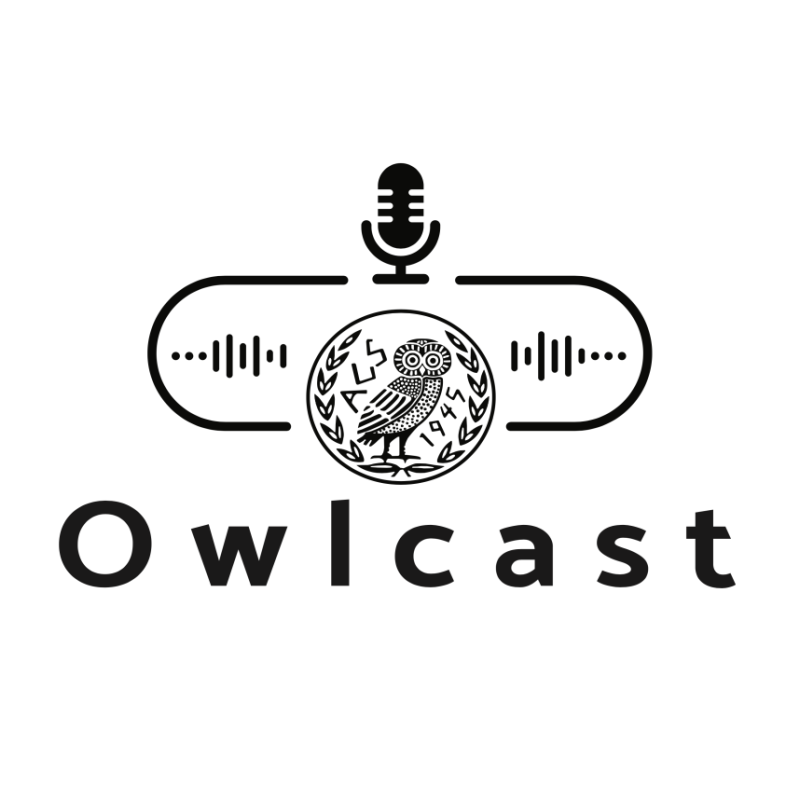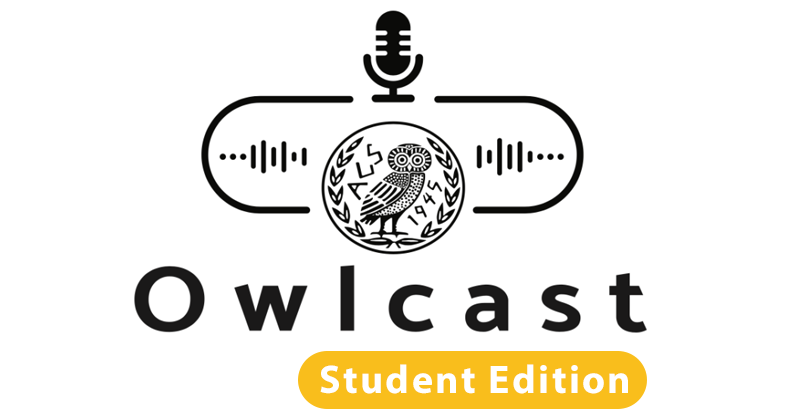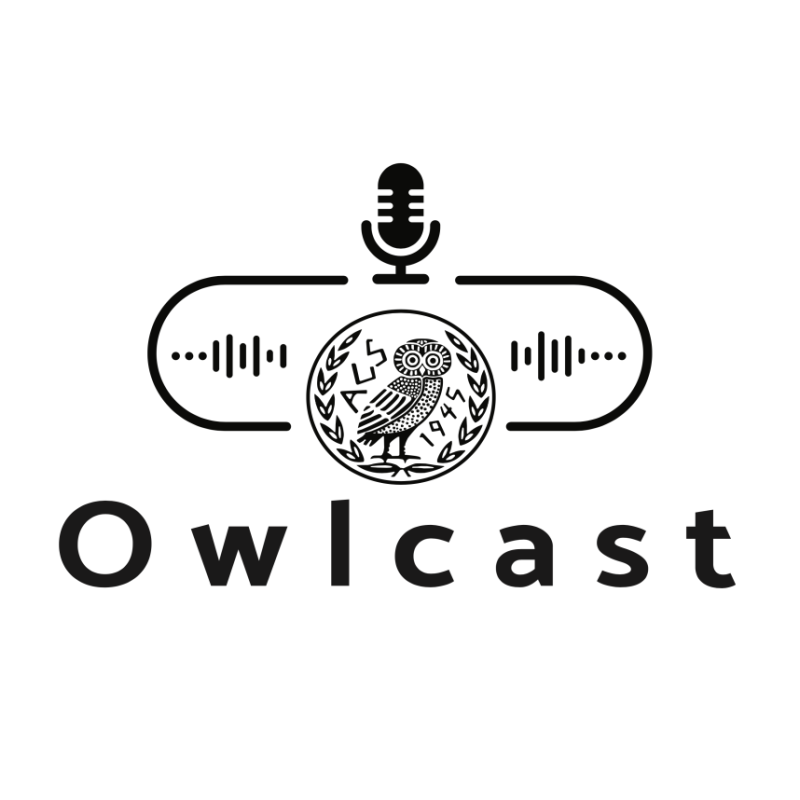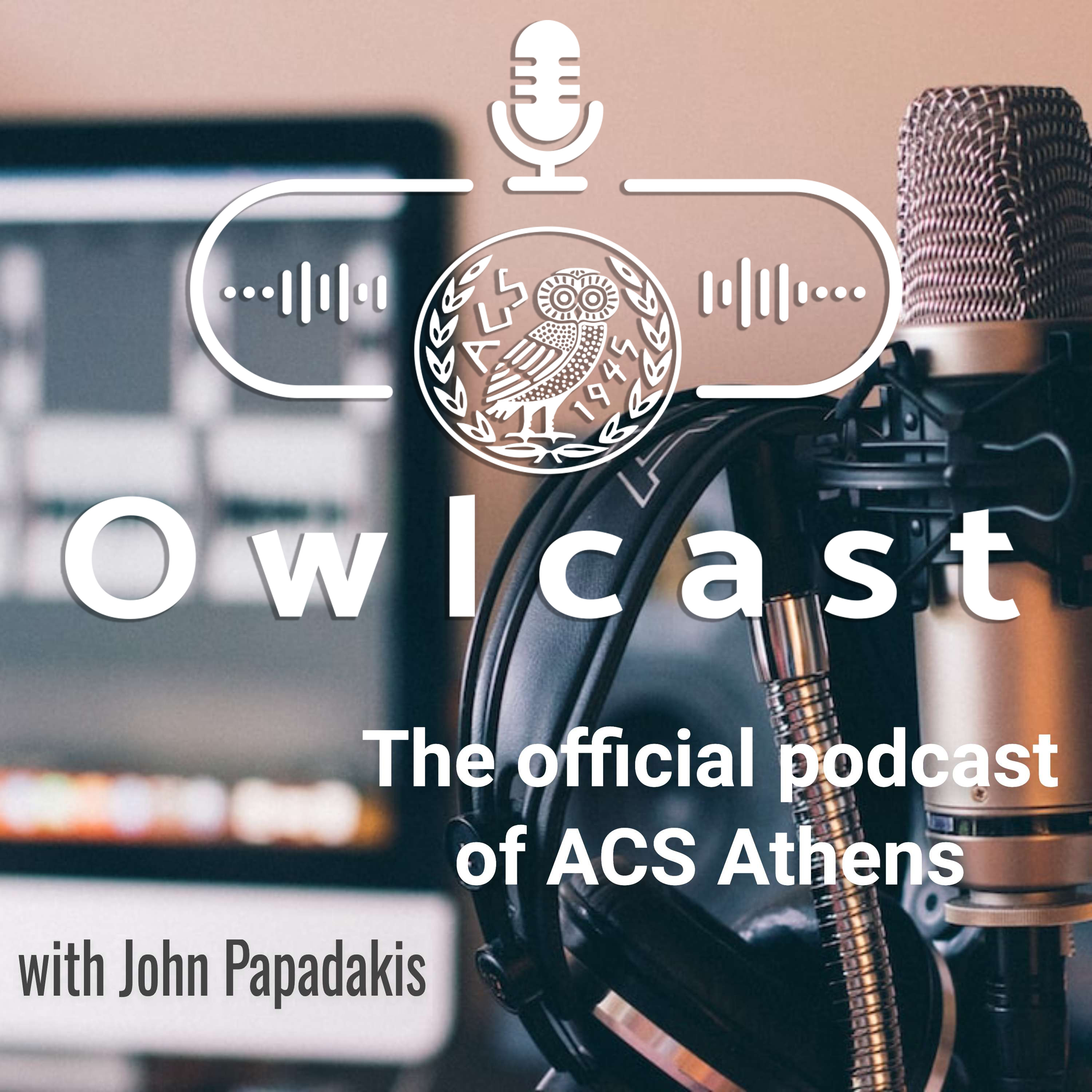Episode Transcript
Speaker 1 00:00:10 This is the Owl Cast, the official podcast of ACS Athens. Listen to the exciting story of the American Community Schools of Athens. Check out what drives all the members of our international community of learners as we create the education of the future. Here's John.
Speaker 2 00:00:42 Welcome to this week's outcast, United Nations Sustainable Development. Goal number 16 refers to peaceful and inclusive societies for sustainable development and to accountable and inclusive institutions at all levels. Sustainability is connected to inclusiveness, and inclusiveness in education cannot be achieved without the implementation of language support programs and cultural awareness initiatives. Language support programs can take many forms depending on the needs of the students and the resources of the school. At a c s, Athens language support includes providing language classes or tutoring sessions outside of regular class time, offering modified versions of assignments or tests to accommodate language difficulties and partnering students with language mentors or peer tutors. Additionally, a big role to language inclusion is when students are fully immersed in the target language throughout the school day to help develop their language skills. Cultural awareness initiatives are also important for integrating foreign language learners into the school system at a ACS Athens, these initiatives include celebration of cultural holidays and traditions, promoting multicultural literature in music, and encouraging students to share their own cultural experiences and perspectives.
Speaker 2 00:02:05 By promoting cultural awareness, schools can help create a more inclusive environment that supports all students, including those who are learning a new language. As our guest today suggests, the key to integrating foreign language learners in the international school system is to create a supportive and inclusive environment that embraces and respects everyone by recognizing and valuing the unique skills and perspectives that these students bring to the classroom. Dr. Jenny Gregor PLU is the ESL EFL K12 coordinator of a AC s Athens. She's part of the a ACS Athens team of educators since 2011, and has been teaching ESL in the middle school and the elementary school to non-native English speakers. Overall, SI has been an ESL educator for 35 years with Dr. Rudo plu. Today we discuss why someone with love of the language choose to teach it. As a second one, teaching language to someone who faces much bigger challenges than learning English. Trust is the key to learning, approaching and convincing parents who are apprehensive to the idea of learning in a different language, thinking or dreaming in English as a sign of language proficiency. The role of the environment in helping students open up to learning, lesson planning on the spot, the effective spontaneity of learning and utilizing AI in the classroom. The benefits for the language learners.
Speaker 2 00:03:45 At a c s Athens, we are fortunate to have students and teachers that follow a journey before they join our community of learners, especially for our teachers. The journey continues within a c s Athens through the years. What has been your journey before you decided that this is your home?
Speaker 3 00:04:04 My journey was long and interesting. My academic journey started off in, uh, university of Maryland in the States, continued in Greece.
Speaker 2 00:04:16 What kind of degree did you get
Speaker 3 00:04:18 There? I received my international management and marketing degree. I started off having my own business. Then, um, I wanted to go back for my master's. I asked my father to do my master's in education. He said it's either business or nothing.
Speaker 2 00:04:35 You asked your father to do your masters. Well, he
Speaker 3 00:04:38 Had to pay for it. <laugh> <laugh>.
Speaker 2 00:04:41 The way it sounded is like you asked your father to do your masters. No, no. Okay. All right.
Speaker 3 00:04:46 So he said it's either business or nothing. And then, uh, I went
Speaker 2 00:04:50 Did you find it useful for your business at the time? I,
Speaker 3 00:04:54 It was very useful for, for me, but it was also useful when I went into education because I also, I had two passions, which was English, um, ESL and literature, and it was also business. So I had, I had my two passions that I could teach. When I went into education, I went back and I got my teacher's degree and my teacher certificate, and I started working for a c s Athens as an educator. But before that, I had started as a shadow teacher. So I went through the whole process of getting knowledgeable about acs, Athens from different perspectives.
Speaker 2 00:05:35 And you've been at acs Athens since?
Speaker 3 00:05:37 Since 2011.
Speaker 2 00:05:39 So 12 years now. Yes.
Speaker 2 00:05:42 Journeys can be educational through schools, others crossing countries or continents, but also by changing teaching mentalities. In our case, the common denominator is the English language. As you mentioned, our students and our families come to experience English through the American educational philosophy, which offers different options for different students regarding their individual strengths and also their challenges. We see students that come here with native English language skills, but also we welcome those who are learners of the language at different levels. Your academic background, as you just mentioned, includes decrease in management and business administration, but you also hold a doctor degree in education, leadership and management. How has this diverse body of knowledge given you the tools for you, what you do now, namely the coordinator for K12 English as a foreign or second language program?
Speaker 3 00:06:37 Well, it is a leadership position, but it's also a teaching position. It actually unifies the different skills that I have acquired from my experience and my academic background. So it, it leads the way I, I have all the background in terms of academics, the knowledge, and it also gives me the expertise and knowledge in order for me to deal with the day-to-day challenges. Either that can be, uh, regarding teaching or it can be working with my team, working with, uh, schools, administration. So
Speaker 2 00:07:13 You mentioned that one of your passions is teaching English as a second language. Yes. Why is that? Why not literature, for example? That's,
Speaker 3 00:07:22 That's a very good question actually, because, um, as you said, our school is an international school, uh, which has a lot of different nationalities. There are students coming here with zero English, and it's actually a big bet in order for me to prepare these students, but not only the students, also my colleagues, to get them ready to work with these students because they're so diverse. The backgrounds, they are so needy. They, we have students coming from war countries, we have refugee students. I also work with youth to youth program. So there is so much diversity in the students who walk through our gates. Like I said before, it's like a big bet for me to prepare them. And when these students are ready to exit the program, the accomplishment that I feel for, for them, first of all, because it's their work, but also for my team, it's very rewarding.
Speaker 2 00:08:19 You, you mentioned the youth to youth. I mean, it's one thing to not know the language and a different thing to be a young refugee, uh, where you have the social-emotional issue. How easy or how difficult it is to teach a language to a student that maybe learning English is not their main concern, their main difficulty.
Speaker 3 00:08:39 First of all, we have to understand that these students, these young people, realize that their only passport into life and freedom is education. So, because that's the most important thing for them. They come here and they're ready to learn. We treat them with so much love and so much respect, irrespective of backgrounds, irrespective of where they're coming from. We are a big hug for them, full of emotion, kindness, and, um, abundant love
Speaker 2 00:09:12 Schools with high academic expectations must have a way to cope with students with language barriers. Uh, we are talking about ESL EFL students. How early or how late should a student immerse in the English language to be prepared for an English language curriculum and still be confident that graduating from the school will bring him closer to attend successfully the college or university of his or her choice? To
Speaker 3 00:09:38 Tell you the truth, there is no right or wrong answer in this because, um, each student learns differently. And, um, like we said, uh, we have very diverse population, so they're coming from different countries, different backgrounds, both educational but also social and emotional. The countries that we have are close to 60, so you can understand that all these people are bringing their own baggage. So there's no right or wrong answer. We, I have had student during the covid years who was online from September till March and then joined us face to face, and he was able to exit cuz he was ready. Although he came almost zero proficiency. It depends, it depends.
Speaker 2 00:10:29 There have been numerous students, I'm sure that went through your guidance and instruction through your years at a c s Athens. Do you remember a student or a class that was quite challenging over the years and you say, oh, I made it <laugh>.
Speaker 3 00:10:45 There are always these cases of, um, situations. It's not a matter of students or classes, it's a matter of situations. And because our students and all students and all children, our mirrors of our society, they bring in to the school what they have in their souls and what they experience in their day-to-day life. So
Speaker 2 00:11:12 Do you have someone in mind?
Speaker 3 00:11:14 I have men in mind. <laugh>.
Speaker 2 00:11:15 Okay. Were they success stories? I mean, what was your plan of success?
Speaker 3 00:11:19 I will tell you, like I said, for our, uh, unaccompanied minors, once you treat a child and any human being, any living thing with love, then it's, it's a success story. Eventually they need time, some need more time than others to be able to trust you because it's a matter of trust. Once you gain their trust, they open up. And that has to do with also learning because once they open up, they're ready to learn and there is a complete success story because you can reach into their, their minds, their brains and their hearts, and you can actually make them what they should be.
Speaker 0 00:12:09 You
Speaker 1 00:12:09 Are listening to the Owl Cast, the official podcast of acs, Athens.
Speaker 2 00:12:23 You mentioned the student that over the covid lockdown from zero, they were able to get out of the program in one year. We have students with native level of English, of course, but we also have those with zero. What quality do these students possess that we can use as a leverage to help them succeed? You mentioned love, you say also respect. What other qualities should the teacher possess? Uh, in order to get through to them and make them motivated to learn the language?
Speaker 3 00:12:58 Patience.
Speaker 2 00:12:59 Patience.
Speaker 3 00:13:00 Perseverance. I think patience and perseverance. I mean, not to let go, but some days are going to be better, some days are going to be worse, but if we show that we are there solid as a rock, then we really
Speaker 2 00:13:16 Win. So we have a new family that is visiting the school. Okay. Okay. Um, and it's a non-English speaking family. They're trying to figure out if this is the correct school, but they have reservations because we're an English speaking curriculum and they're coming to you. What do you tell them? How do you approach the parent who they are, you know, apprehensive of changing from the native language to a different language? First
Speaker 3 00:13:43 Of all, I think that whoever joins and walks in through the air gate is ready to join us. I
Speaker 2 00:13:50 Why do you say that? Because
Speaker 3 00:13:51 Our school has an amazing reputation for both native speakers, but also for non-native speakers. And I know that we have a big, uh, population of Asian students, for instance, I don't need to say anything because our school is an advertisement by itself because of its great success stories and great reputation in the academic and not only world. What I say is give us the time and trust us and you will see what the outcome is going to be. The American curriculum is known worldwide. ACS is known for its services and what, what it offers to the students. So the only thing that we need is a little trust. And
Speaker 2 00:14:40 So I'm the parent. Yes. And uh, you're asking me to trust you. Yes. And I'm asking you, how long do you want to spend with my child before he or she is able to follow the English curriculum? Is it a year, is it half a year? It depends on the grade. I mean, I,
Speaker 3 00:15:00 I will tell you what research says and what we do in our school. So reach research says that in order for someone to gain the academic language, which is called kelp in, in our science and art, you need three to seven years
Speaker 2 00:15:16 For mastery to be proficient. Yes.
Speaker 3 00:15:20 So in order for a student to be able to function within a class, we need six months to a year.
Speaker 2 00:15:28 Is this the time that you need to start thinking in English? No. I I, without translating in your native language? It
Speaker 3 00:15:34 Depends on the student again, because there is no, there is nothing set in stone. But, uh, from my experience, within six months they start thinking in English.
Speaker 2 00:15:44 How about dreaming in English? <laugh>?
Speaker 3 00:15:46 I don't know. <laugh>.
Speaker 2 00:15:49 I've heard that too. Really? That I felt ready for the language when I started dreaming in English.
Speaker 3 00:15:55 That's really interesting.
Speaker 2 00:15:56 But I'm not going into dreams <laugh>, it's outside my realm. <laugh>. So, uh, might do <laugh>. I have the suspicion that you're reading a lot of books. Yes. Do you remember a book or a phrase that has stood in your mind? Recent or in the past?
Speaker 3 00:16:12 Mm, so many that it could
Speaker 2 00:16:14 Be fiction, it could be on your field. What's the latest one that you read?
Speaker 3 00:16:19 Okay. I'm reading a lot of leadership books because I'm working on my post-doctorate and educational leadership and management because I am a lifelong learner. In my free time, I also read Jay Sheti, think Like a Monk. I don't remember. I'm not very good at memorizing. But um, actually the one that has really struck me was by Aristotle that he said that educating the mind without educating the heart is not educational at all. I think that that's the quote that actually drives my teaching and
Speaker 2 00:16:55 Learning. So is, is this your message to your students? What do you say to your new students who came this year full of anxiety? I know that you're trying to educate their soul and their heart, but how do you convey that to a student who's coming for the first time?
Speaker 3 00:17:12 First of all, if you teach with consistency, if you teach in an environment that they feel safe, an environment that has rules, we have our three Rs for instance, read Dear, respectful, and responsible. There are consistent steps in instruction. They realize slowly or fast. It depends on the student again, that this is a learning environment. And the more you emphasize that this is a learning environment and that here we treat each other with great respect, irrespective of how fast each person learns or, you know, we have different intelligences. Other people are more artistic, others are more scientific in terms of how they process their thoughts and their thinking. So we have to respect each other for differences. And the, the diverse backgrounds that we come from, this is it. I mean, making them feel safe, making them feel respected. That's where they blossom cuz they feel confident, they're ready to open up.
Speaker 2 00:18:16 Uh, another educator very recently told me that maybe the idea that the priority of preparing a classroom learning plan might not be the best for the students when you know that most of the knowledge that is gained is gained on the spot. They discover knowledge on their own. What are your thoughts about this?
Speaker 3 00:18:40 Actually, I totally agree on this because this is what I do. I have, we have our scope and sequence, we have our curriculum, we have of course our materials, but an educator must be open to work on the spot. So we have our lesson plans, we have everything that needs to be covered, but something might arise spontaneously. So you juggle around what you have, your materials, your knowledge, and you can actually work on that. I will give you an example. The other day I was working on, my lesson plan was on communication. And then from what I gathered in the class, they were two different opinions and I felt that this was the right time to begin a debate. Perfect. So I completely restructured the whole lesson plan on the spot. Literally on the spot. And I created a debate. The the students were so amazed with all this energy that built up around this on the spot lesson plan that they didn't even want to go to have lunch because the bell rang.
Speaker 2 00:19:47 So they felt included in the process of creating a class.
Speaker 3 00:19:52 Yes.
Speaker 2 00:19:53 That's great. Finally, Dr. Regor Bulu. There is a lot of discussion lately and it prompts us to continue in the years come about the use of AI powered chatbots in the classroom. Essentially, as they say, an AI chatbot is designed to understand natural language input and provide the relevant human-like response. As it has been written and explained by English language educators around the world, students could practice their conversation skills by engaging in dialogue with an AI chatbot that responds in real time, providing immediate feedback and correction. AI chatbots can also assist with grammar and vocabulary instruction through reading and writing exercises. However, it is more than evident that AI chatbots are not a replacement for human interaction and guidance. Yes, they are a useful tool for language learners, but they do not possess the same level of cultural and linguistic knowledge. As a human teacher, what is your experience, if any, and how do you see this evolution of teaching and learning?
Speaker 3 00:21:01 I think that all this AI evolution is an amazing tool if it's used appropriately and it to its maximum by educators. Of course there is a lot of need for training in order for someone to use this. I will give you an example why it's so useful. We have something similar, um, in different, uh, platforms that we use for ESL and D F L and the students are able to record their own voice for homework, for, for their assignment. And they're able to hear themselves and record again and hear themselves and do it over and over. This helps them practice when the educator is not there. That's a big plus. So that's one thing. The second thing is that our students are digital natives. So they love doing these things. They, they love being with computers, iPads, iPhones, all, all these different items. So I think it's very important that we, that we use these tools because they are very, they come in handy and they, we should not fear them. We should not be afraid of using them. They're here to help us. They're here to take our students, uh, learning to a different level next level. Plus they're here to engage our students more because since they are digital natives and like, like using these tools, why not let them use them? Why not use them to their and our advantage?
Speaker 2 00:22:34 We have to find disadvantages as we go along. And I'm pretty sure from what you're saying, you disagree with those schools that ban them at this point? Yeah. We don't know where it's going to take them. I'm pretty sure they're going to review and revise. Um, but I think that, uh, this is somewhere that everybody's going to and, uh, we have to start getting used to living with this kind techno technology. Dr. <unk>, thank you so much for being with us. It's been a pleasure talking. Thank you. And um, as you said, keep living like a monk.
Speaker 3 00:23:08 <laugh>, thank you.
Speaker 2 00:23:09 Although I don't know what the book is about. It sounds interesting though. It's a
Speaker 3 00:23:12 Very interesting one.
Speaker 2 00:23:13 Thank you so much. Thank
Speaker 3 00:23:14 You.
Speaker 1 00:23:17 You are listening to the icast, the official podcast of AC s Athens. Make sure you subscribe to the ICAST on Google Podcast, Spotify and Apple Podcasts. This has been a production of the AC s Athens Media Studio.



